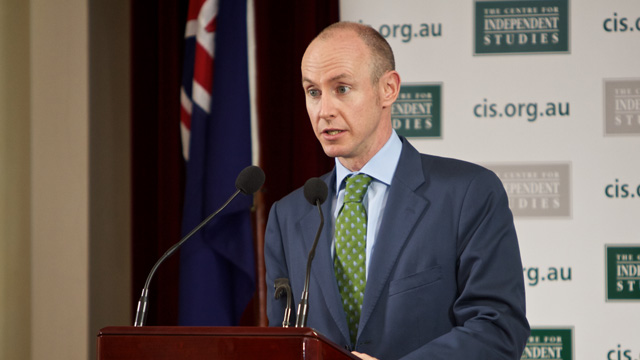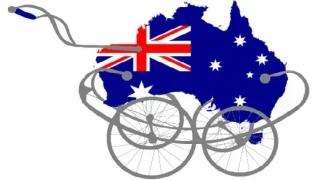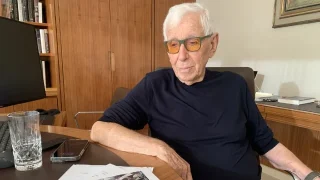
Nick Cater in conversation with Daniel Hannan MEP
February, 2014
Daniel Hannan is one of the leading intellectual forces in British politics.
The clarity of his ideas and sharp rhetorical skills have earned him a remarkably high profile for a Member of the European Parliament.
Hannan’s speech attacking former Labor leader Gordon Brown as a ‘devalued prime minister’ has been watched by 2.9 million on YouTube, a larger audience than Julia Gillard received for her misogyny speech.
Hannan, a staunch Euro-sceptic, entered the European Parliament in 1999 vowing to abolish the institution he had been elected to serve.
In his latest book, Inventing Freedom: How the English-Speaking Peoples Made the Modern World, Hannan draws on his background as a historian to trace the origins of the liberal democratic institutions we are inclined to take for granted.
Hannan spoke to CIS Visiting Fellow Nick Cater this week by phone from Brussels as he prepared for a speaking tour in Australia starting in Perth on 24 February.
Nick Cater: The project of colonisation receives a bad press these days, but you say Australia owes its success to the sentiments and civic institutions brought here by the British.
Daniel Hannan: It is natural to become blasé about the familiar, and Anglosphere societies tend to take for granted the rule of law, personal liberty, free contract, regular elections, uncensored newspapers, equality between men and women, jury trials, habeas corpus …
But these things are not the natural condition of mankind. They’re not even Western values, or rather they became Western values only—if we are to be blunt—because of a series of military victories by the English-speaking people. These were precepts overwhelmingly developed in the language in which you and I are now talking.
We delude ourselves if we imagine that every country will automatically get there when it becomes wealthy, educated or developed enough. Compare Australia with its neighbours, Indonesia or Vietnam, for instance.
NC: You’ll be familiar no doubt with the views that Australia found success ‘riding on the sheep’s back.’ To me that suggests a rather passive route to prosperity. Yet there was nothing accidental or inevitable about Australia’s success.
DH: No. Australia was settled in incredibly difficult circumstances, as I understand it. The prospects faced by the first British colonists were, from our current perspective, almost unimaginably harsh—the distance, the unfamiliar flora and fauna, and the lack of any resources beyond what the settlers had brought with them. And yet Australia now enjoys on any measure one of the highest standards of living on the planet.
Why did that happen in Australia rather than in any of it neighbouring countries? Well, the really precious resource those early settlers brought with them to Australia was a way of arranging their affairs that elevated the individual above the state and the rule of law above the power of the executive. That’s the magic ingredient that led to modern capitalism and modern freedom.
Once it’s there, people will come from all over the world and benefit from it. It doesn’t matter whether your ancestors are Croatian or Greek or whatever. Everybody does better under that system. The reason a child of Greek parents in Melbourne is better off than a child of Greek parents in Mytilene has nothing to do with race and everything to do with political structures.
NC: Would the Dutch or the French have made such a good job of it?
DH: The French wouldn’t have. They had a very different style of government and colonial administration.
The Dutch might well have done so. The Netherlands and the British Isles were developing very much in parallel towards individualism and free trade. In fact, the Dutch beat us to it in one important sense. They got the modern system of capitalism—if we define it as limited liability and joint stock ventures—slightly before us.
So why is it that the English-speaking people rather than the Dutch ended up spreading liberty? It was an accident of geography. The balance of power tilted overwhelmingly from the low countries to Great Britain in the last decade of the seventeenth century and the first two decades of the eighteenth century. Britain was an island and didn’t need a big standing army. It relied on its navy. The Dutch had the misfortune of occupying an almost indefencible low-lying plain, and between 1689 and 1720 they were exhausted in a series of defensive wars against the French. And that’s the period when the Dutch trading houses and banks started relocating from Amsterdam to London. It is to that moment that we can trace the Anglosphere’s rise to global dominance.
NC: There is an ongoing debate in Australia about a national curriculum. The frequently expressed view on the conservative side is that the draft curriculum pays too little attention to Australia’s European cultural heritage, often characterised as ‘the Judeo-Christian tradition.’ But I suspect you would describe our heritage as something subtly different, something that draws upon more than religion.
DH: Yes. There is a unique lineage of liberty you can trace back in the English-speaking world that is qualitatively different from the Polish experience, the Russian experience, or the Italian experience. It is true that it can’t be wholly divorced from the religious context in which all political discourse took place until very recently. It’s probably also true to say that in the early stages, the individualist culture of the Anglosphere was, in political terms, influenced by Protestantism.
That is not the same as saying ‘liberty’ was stronger among Protestants. One of the things that always struck visitors from Europe particularly from Catholic European countries, is that American Catholics had the same attitude to personal liberty as English-speaking Protestants.
There was a political culture that drew from the specific religious teaching that emphasised the individual over the hierarchy. But the outcome of that has long since transcended its denominational roots. There is an Anglosphere culture that is as strong in Ireland or, for that matter, Singapore as it is in Australia or Britain.
NC: How do you respond to the accusation that the theory of Anglospheric exceptionalism adopts a racist interpretation of history?
DH: That’s the default setting for people who can’t be bothered to read the thesis. It’s demonstrably false. The Anglosphere is why Bermuda is not Haiti. It’s why Hong Kong is not China. It’s why Singapore is not Indonesia. The beauty of these values is they are transferable.
There was a time in the Victorian period when Anglosphere values became mixed up with the then-prevalent ideas of racial determinism. But I don’t think anyone could conceivably claim now that Anglosphere values are transmitted genetically rather than intellectually. Every Anglosphere country, including the United Kingdom, has received massive populations from elsewhere—and the extraordinary thing about this is that it applies to all individuals. Your grandparents could have come from the Ukraine or Vietnam, but once you get the hang of living in a society characterised by personal liberty and the rule of law, there is no going back.
NC: Is this an argument in support of multiculturalism? Is the nation’s shared philosophical framework adopted by all those arrive?
DH: It depends what you mean by ‘multicultural.’ In Britain, the Left sees the word as almost synonymous with ‘multi-ethnic,’ which plainly it isn’t.
If by multiculturalism you mean valuing different sets of civic values equally, then I am an opponent. It’s possible to have a cohesive state where people will eat differently and dress differently and pray differently, but it is not possible to have a functioning state where they have completely opposed views about the role of democracy, the relationship between the individual and the state, the role of secularism, and so forth.
One of the things English-speaking societies were very good at until recently is accepting people as individuals without hectoring, or saying that you have to leave behind your cultural tradition, but you did have buy in to a certain way of doing politics. And the reason people were happy to buy into the way they did politics was it works.
When I was last in Australia I was struck, and quite moved, by the multi-ethnic makeup of the people who had come to listen to me hymning the virtues of the Anglosphere. And as far as I could tell, they were pretty ethnically representative of the cities I was speaking in. That’s a tremendous tribute to a political system that holds out something people want to belong to. Personal freedom, free contract capitalism, common law—people want to buy into that. They cross half the world to find a better system than the one they are choosing to get away from.
NC: Where does the Enlightenment, and specifically the Scottish Enlightenment, fit into the jigsaw of the creation of liberty?
DH: The Anglosphere has had different capitals at different times. It was briefly Philadelphia, and then London, but there was definitely a time when the capital was Edinburgh. The legacy of David Hume, Adam Smith, and others is palpably around us now.
The tragedy is that that legacy is not palpable in Scotland. The country that gave us the purest and best expression of Anglosphere economics through the works of Adam Smith has completely turned its back on its own son and his teachings.
Margaret Thatcher frequently said she could not understand why the Scots did not vote for her. They are famous for being thrifty and provident and hard working. One of her Scottish MPs said to her: ‘It’s true most Scots are like that, Margaret. But most Scots who are like that are no longer in Scotland. They are the ones who emigrated to England or Canada or Australia.’
I think there is a more prosaic explanation. In the 1980s, when Thatcher was prime minister, successive Scottish secretaries tried to kill separatism with kindness by securing and spending bigger and bigger budgets north of the border. And predictably, a higher percentage of people became dependent on the state. And then they voted Labour.
It became a rational career choice to work for the government, and so the best and brightest kids gravitated into the public sector instead of making or selling things. If they really were entrepreneurs, they would move to another part of the English-speaking world. That’s the real tragedy of Scotland, and I say this as the child of a Scottish mother.
NC: In Inventing Freedom you write: ‘Having developed and exported the most successful system of government known to the human race, the English-speaking peoples are tiptoeing away from their own creation.’Can you expand?
DH: The more I researched this topic, the more I came to the conclusion that the real exceptionalism of the Anglosphere could be found in our bizarre, anomalous, beautiful legal system. The miracle of common law is that is assumes residual rights and assumes personal liberty. It is not a system that anybody would invent.
The logical way of creating a legal system is the way they do it in Europe—the Roman law or the Bonapartist thing where you write down the law in the abstract and apply it to specific cases. It’s extremely odd to have what you and we have, a system where nobody wrote down the law—it just kind of emerged. It grew like your Great Barrier Reef, coral by coral, each case leading to the next one.
One consequence is that it is assumed that you are completely free except in so far as a law has had to be developed to protect somebody else’s freedom. And that leads to a completely different mentality that, until very recently, served to keep the state small.
NC: If I’m interpreting you correctly, the implication is that the expansion of the state is inherently illiberal.
DH: The other great civilisations of the world, the Mings or the Moguls or the Ottomans, all ended up going down the road of high taxes, uniformity, bureaucracy and over-regulation. And they all went into decline. The Anglosphere was always a diverse plurality based on elevating enterprise and individualism. I’m not sure this uniqueness will survive the expansion of the size of the state we are now experiencing.
I think Britain went wrong first. Of the core Anglosphere countries we’re in a much worse state than you are, and the reason is we were in World War II in more intense way. There was a total marshalling of national resources for the war effort and nationalisation, ID cards, rationing and so forth. Powers given to the government, supposedly contingently for the war effort, were not returned when the peace came.
The welfare system we have to this day was conceived in the early 1940s. The National Health Service and the education system were war babies; they came out of a mentality that held it unpatriotic to complain about or question authority. That was the beginning of our flight away from individualism. It happened in other English-speaking countries more slowly and later, which is why I think your position is better than ours.
NC: The European Union is, of course, a particular problem.
DH: Yes. That’s the huge additional nightmare we face that the rest of the English-speaking democracies, other than Ireland, do not. Being in the European Union means accepting the primacy of EU law over national law. It’s meant a revolution in our legal system and it’s meant a revolution in the assumptions of what government does.
The great advantage of Britain leaving the European Union, apart from us being able to trade with the wider world, is that we would—I hope—rediscover the libertarian tradition that used to go with the common law.
NC: In that neat little book you wrote on the European Union, A Doomed Marriage (2012), you suggest that Britain would have fared better if it had continued to trade with the Commonwealth rather than throw in its lot with Europe.
DH: Yes. In retrospect we couldn’t have timed it more badly. We went in at the beginning of the 1970s when it looked as if the Commonwealth was in decline and all the action was in Western Europe. Between 1945 and 1973, Western Europe spectacularly outgrew Britain and the Commonwealth, and indeed the United States for that matter.
We joined the European Union in 1973—and Europe’s growth came to end with the oil shock of 1974. And just at that moment the Commonwealth began its economic take-off that is continuing to this day. It was a calamitous error economically, let alone for the ties of sentiment and affection that bound us to the old dominions, in particular.
NC: You say Australia’s intellectuals regard Anglosphere values ‘as a distraction from their country’s supposed Asian destiny.’ Could pro-Asian sentiment send Australia off course in the same way pro-European sentiment sent Britain off course?
DH: To be absolutely clear, I do not mean you should not be profiting from the economic growth of Asia. You would be crazy not to do that. Your geographical location and time zone is a huge asset. One of the reasons Australia and New Zealand are doing better than Britain is that our immediate neighbours are in economic collapse and your immediate neighbours are growing. If I was an Australian, I would be in favour of maximum free trade with everybody.
But it doesn’t follow that you need to redefine your political system. On the contrary, yours has demonstrably worked better than most of those on the Asian mainland. The only places in Asia that have a comparable climate of economic freedom are two other Anglosphere countries: Hong Kong and Singapore.
I was really struck when I was in Australia last that the kind of people who saw Asia as an alternative to the Anglosphere were the precise equivalent to British Europhiles, politically and socially. They were equally dominant in the same fields, in parts of the media and parts of academic life, and they had exactly the same attitudes that British Euro fanatics have. They think they are the majority, because everybody they know thinks like them and the general population doesn’t feature.
NC: The entrenchment of what we might call the cultural eliteis clearly an international phenomenon. And we shouldn’t be surprised at that since they share a universalist outlook. They like to think of themselves as citizens of the world, which I imagine you would find a troubling concept.
DH: Yes. The European construction itself assumes that national loyalties are arbitrary, transient and discreditable. The difficulty post-nationalism faces, however, is that you cannot legislate against human nature.
Let’s say you’re watching news footage of a disaster on the other side of the world affecting strangers. There’s something almost wrong with you if that affects you in exactly the same way as watching the footage of a natural disaster in your hometown where you know the people. There would be something inhuman about that. It may be irrational, but it is no less powerful for being irrational in the same way we feel differently about our own kids than kids in general.
It’s bad politics to try to wish away human nature or to legislate as if it didn’t exist. You’ve got to start with the reality of how people are made and then try to design political institutions suited to the way we’ve evolved.
NC: The draft Australian Curriculum has three cross-curriculum priorities and themes: Indigenous heritage, sustainability, and engagement with Asia. It seems the last of those could be used as a device to steer us away from the Anglosphere.
DH: And this is exactly why you shouldn’t have a national curriculum. We introduced ours in 1988 when Margaret Thatcher was prime minister and supposedly as a way of stopping loony Left teachers. In fact, totally predictably, it was immediately captured by the very people it was supposed to deter. It was dragged, as these things always are when they get into the hands of the permanent bureaucracy, to the far Left.
I can’t imagine that the current prime minister of Australia would design a curriculum along the lines you suggest. But I sometimes think you have to have been in politics to see how powerless the elected representative is. Your ability, even as a national leader, to take on this powerful, permanent apparat, of this standing leftist bureaucracy, is remarkably limited.
Inevitably, if you give them a national curriculum, no matter how huge the conservative majority might be in parliament, it is going to be taken over by the cultural relativists and the politically correct. The answer is not to get your guys in charge of it. The answer is to scrap it and let parents pick what schools they want—parents can invigilate the system a billion times better than any conservative politician.
NC: Why does the centre-Right seem so hopeless at winning these cultural arguments?
DH: It’s not that they’re hopeless. They’re up against impossible odds. Imagine you’re an MP. Think about how your week works: you’ve got constituency work; you’ve got correspondence to attend to; you’ve got to turn up to debates; you’ve got to be glad-handing other MPs. And then you’re made a minister as well. And you’re one guy.
In your department you have 500–600 people working Monday to Friday on their agenda. There is no way you’re going to impose your will on them. That’s the iron law of politics. So your best option is to do what our Education Secretary Michael Gove is doing in London and recognise that you cannot impose victory in a culture what on the Left educational establishment. So you let schools opt out of it. You trust the parents to do the right thing.
And it’s worked. Our standards have turned around since Gove took over.
NC: On domestic British politics, you have been quoted as saying that you think an association between the Conservatives and the UK Independence Party (UKIP) would be a better fit than a coalition with the Liberal Democrats. Why is that?
DH: What I’m interested in, in the short term, is a Tory-UKIP accommodation of some kind at the next election. It is possible for Cameron to win without it, but it is much, much harder.
NC: Yes, it seems Australia is one of the few Western democracies where the Right hasn’t fractured. The mainstream Centre Right party hasn’t had a serious socially conservative, nationalist counterforce.
DH: That’s right. Obviously your voting system makes that easier in one sense.
NC: What about you? Have you any personal ambition to win a seat in Westminster?
DH: No. It’s not something I’m interested in.
NC: And yet you have a high profile for a Euro MP. For instance, the YouTube recording of your devalued-prime minister attack on Gordon Brown has had more hits than Julia Gillard’s famous misogyny speech.
DH: Nobody ever believes me, but I didn’t particularly enjoy it. I don’t particularly enjoy being a politician. I’m in politics to put myself out of work. I’m longing for the days when there are no more British MEPs.
Daniel Hannan is visiting Australia in February:
CIS lunch with Daniel Hannan in Perth, 24 February 2014, 12:15pm – 2:00pm. Details and tickets
Quadrant dinner with with Daniel Hannan in Sydney, 26 February 2014, 6pm. Details and tickets
Quadrant dinner with with Daniel Hannan in Canberra, 27 February 2014, 6pm . Details and tickets
CIS lunch with Daniel Hannan in Melbourne, 28 February 2014, 12:15pm – 2:00pm. Details and tickets
Inventing Freedom and Why It Matters by Daniel Hannan is published by HarperCollins











